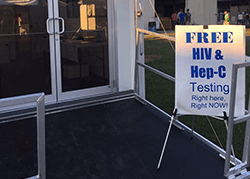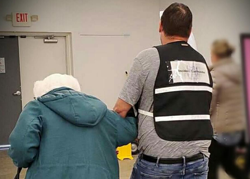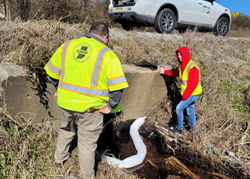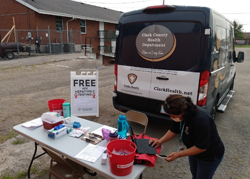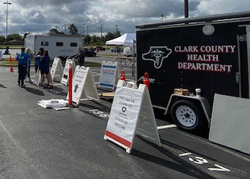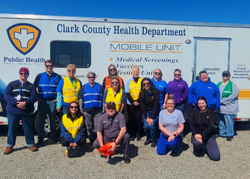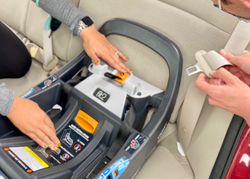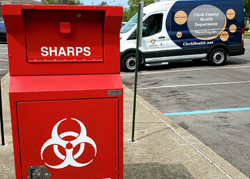The Clark County Health Department regulates public and semi-public water facilities in Clark County, Indiana. Public and semi-public water facilities include swimming pools, spa pools, hot tubs, wading pools at apartments, condominiums, townhouses, hotels, motels, schools, community centers, health clubs, mobile home parks, campgrounds, resorts, etc... The goal of this program is to help industry provide facilities that are free of safety hazards and risk of disease.
The Clark County Health Department requires an operating permit for all public and semi-public water facilities in Clark County, Indiana. For more information on applying for a permit or renewing a permit visit Public Water Facility Inspections below. An opening inspection of the facility will be required.
Water Chemistry For Public Water Facilities
Proper water chemistry is crucial for safety and health in public water facilities. The following information regarding decreasing and increasing chlorine should be helpful in maintaining the quality of the water in swimming pools, spas, hot tubs and wading pools in Clark County.
How To Shock a Pool
The "smell of chlorine" in a pool is actually the smell of chloramines, the chemical compounds formed when chlorine combines with sweat, oils, urine and other contaminants in the water. Chloramines are not as effective for disinfecting the water and can cause eye and skin irritation. Breakpoint Superchlorination or "Pool Shocking" is required to combat the loss of effective chlorine in the water. The water facility shall be supercholrinated when a combined chlorine concentration of five-tenths (.5) ppm or greater is documented by pool testing.
If you are shocking a pool the Indiana State Department of Health Pool Shocking Guidelines may be of assistance.
Public Water Facility Chemical Log Sheets
Public water facilities are required by 410 IAC-6-2.1 to keep a record of the pool water chemistry. Please use the Indiana State Dept of Health Log Sheet to record pool water chemistry tests.
Building Code Regulations for Swimming Pool Remodel or New Construction
A pool being remodeled or a new construction may be subject to review by the Indiana Department of Homeland Security (IDHS). Please contact both IDHS and the environmentalist at the health department when submitting plans.
Public Water Facility Inspections
The Clark County Health Department regulates public water facilities in Clark County, Indiana. Public water facilities include all publicly used swimming pools, spa pools, hot tubs, and wading pools.
An operating permit for all public, semi public water facilities in Clark County, Indiana is required. You can download an Application for Public Water Facilities or call the Clark County Health Department at (812) 282-7521 for more information.
Opening a Public Pool
A pool in Clark County may not open until an inspection has been completed by an environmentalist of the Clark County Health Department, this includes seasonal pools who require a one week wait time for sampling of a previously drained pool or a pool that has not operated for a length of time (seasonal pool). During the inspection the environmentalist will check for compliance with Rule 410 IAC 6-2.1 and any other local, state, or federal rules that may apply. Inspections are performed randomly without announcement after the opening inspection.
We encourage pool operators to schedule inspections at least a week prior to anticipated opening with an environmentalist and to ensure that a water sample has been taken one week prior to the preferred opening date. A pool may be required to close if violations of 410 IAC 6-2.1 are found to exist during the inspection.
Please Note: IF A POOL HAS BEEN CLOSED AND NOT HAD DISINFECTANT ACTIVELY TREATING THE FACILITY OR THE POOL HAS BEEN DRAINED, A SATISFACTORY WATER SAMPLE MUST BE COLLECTED ONE WEEK PRIOR TO OPENING OF THE POOL. THIS RULE SHOULD BE CONSIDERED WHEN DETERMINING OPENING DATE FOR SEASONAL POOLS.
Recreational Water Illnesses
The Clark County Health Department is dedicated to reducing recreational water illnesses (RWI's). RWI's are illnesses that are spread by swallowing, breathing, or contact with contaminated water from public water facilities, as well as lakes, streams and rivers. RWI's can cause a wide variety of symptoms, including infections in the eye, skin, ear, respiratory tract, and in wounds. The most commonly reported recreational water illness is diarrhea. Diarrhea illnesses can be caused by germs such as e. coli, cryptosporidium, giardia and shigella. More information on recreational water illnesses can be found on the Centers for Disease Control (CDC) safe swimming website.
Cold Plunge Tub Guidance
The Indiana Environmental Health Association has developed a guide to outline code requirements and best practices for operation and inspection of low-volume, prefabricated, single-user cold plunge or cold immersion therapy units.
Click here to view the Cold Water Plunge Guide



